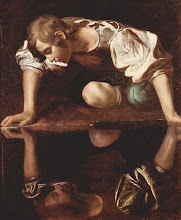 The Venerable Bede (672/3 - 735) was given to the monastery of Monkwearmouth and Jarrow by his parents as an oblate when he was seven years old. Apart from short trips he spent the rest of his life in the monastery. In a brief note about himself appended to his "Ecclesiastical History of the English People", Bede said
The Venerable Bede (672/3 - 735) was given to the monastery of Monkwearmouth and Jarrow by his parents as an oblate when he was seven years old. Apart from short trips he spent the rest of his life in the monastery. In a brief note about himself appended to his "Ecclesiastical History of the English People", Bede said... I was given, by the care of kinsmen, at seven years of age, to be educated by the most reverend Abbot Benedict, and afterwards by Ceolfrid, and spending all the remaining time of my life a dweller in that monastery, I wholly applied myself to the study of Scripture; and amidst the observance of monastic rule, and the daily charge of singing in the church, I always took delight in learning, or teaching, or writing. (Sellar's revision of J. A. Giles translation)(public domain picture from wikicommons of leaf from 8th century manuscript of Bede's "Ecclesiastical History of the English People", now in St. Petersburg)
Despite its rather dry title, Bede's "Ecclesiastical History of the English People" is probably his best-known and most-read work today. Bede also wrote biblical commentaries, biographies, hagiographies, hymns, and works on the Latin language and the calendar, and when he died he was working on a translation of John's Gospel into Old English. Although since Dionysius Exiguus fixed the date of Jesus's birth (and got it wrong!) and used it in tables for calculating the date of Easter each year, Bede was the first historian to use the year of Jesus's conception and birth as a fixed point for dating historical events. In effect, then, he invented the BC and AD system we use today.
Anglican and Catholic biographies of Bede.
The Medieval English Sourcebook has translations of some of Bede's works:
Ecclesiastical History of the English People, probably translated by L. C. Jane,
The Life of Saint Cuthbert, translated by J. A. Giles,
The Lives of the Abbots of Wearmouth and Jarrow, also translated by J. A. Giles.
The Christian Classics Ethereal Library has another translation of the "Ecclesiastical History of the English People".
The Online Library of Liberty has Bede's complete works in J. A. Giles's edition, some in both Latin and English, others only in Latin.
BBC Radio 4's discussion programme "In Our Time" devoted a programme to Bede (although you can still listen to the programme, many of the links on the research page are broken).
There is a museum in Jarrow about Anglo-Saxon Northumbria called Bede's World. I hesitate to say Michelle of Heavenfield's blog is about Bede, because it covers so much more about the people and places Bede wrote about, but anyway, it is well worth exploring.

James Doyle Penrose exhibited this painting titled "The Venerable Bede Translates John" at London's Royal Academy in 1902 but I have not been able to discover where it is now. For other artists' portrayals of Bede, search for Bede in this list of Anglo-Saxon themed paintings from Cambridge University.(public domain picture from about.com's Medieval and Renaissance History Portrait Gallery)
The Youtube clip below has a church choir singing one of Bede's hymns.





No comments:
Post a Comment